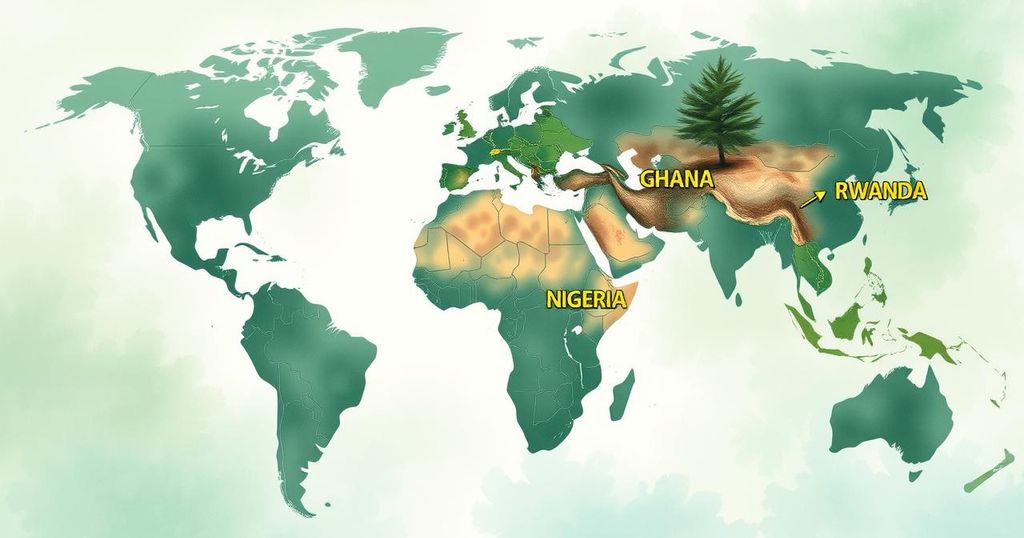Ghana, Nigeria, Chad, and Rwanda Rank Among the Most Polluted Countries: 2024 Report
The 2024 World Air Quality Report indicates that Ghana, Nigeria, Chad, and Rwanda are among the most polluted countries in the world. Chad leads with a PM2.5 level nearly 18 times higher than WHO recommendations. Ghana’s pollution is growing rapidly, now posing significant public health risks and potential economic consequences, emphasizing the need for urgent action and enhanced monitoring.
The 2024 World Air Quality Report has exposed drastic levels of pollution in Africa, with countries such as Ghana, Nigeria, Chad, and Rwanda ranking among the most polluted. This crisis poses a significant threat to millions of individuals, underscoring the urgent need for improved air quality management.
Chad leads globally with a concerning PM2.5 concentration of 91.8 µg/m³, starkly surpassing the World Health Organization’s guideline of 5 µg/m³. Other countries include Nigeria at 11th place with 40.1 µg/m³ and Rwanda at 9th with 40.8 µg/m³. Ghana is ranked 14th with a PM2.5 level of 35.8 µg/m³, indicating a severe air quality issue.
PM2.5 particles, which are extremely small and hazardous, can infiltrate lungs and bloodstream, contributing to respiratory and cardiovascular diseases. These pollutants are significantly smaller than conventional dust, posing hidden yet lethal risks. According to findings from the University of Chicago, highly polluted areas experience a reduction in life expectancy by approximately 2.7 years.
Ghana’s situation has become more critical, as its air pollution now exceeds WHO’s threshold by sevenfold. The capital city, Accra, ranks as the 16th most polluted city globally, but Kumasi has surpassed it as the most polluted city with annual PM2.5 levels of 39.5 µg/m³.
Historically, Ghana’s pollution levels have escalated steadily: from 30.2 µg/m³ in 2022 to 35.8 µg/m³ in 2024, marking a move from 27th to 14th place. This alarming trend highlights deteriorating air quality over a short period.
The broader African continent witnesses relentless pollution challenges and insufficient air quality monitoring. The report reveals that five of the top ten most polluted countries are situated in Africa, with only 24 out of 54 nations reporting air quality data due to lack of infrastructure.
Ghana’s air pollution problem exemplifies a national health emergency, with WHO estimating 28,000 deaths annually linked to poor air quality. The continual rise in pollution levels suggests a future trend that would significantly increase mortality rates due to toxic air exposure.
Moreover, the economic ramifications of this crisis are dire; air pollution could cost Ghana’s economy approximately $137.8 billion by 2040 without decisive intervention. Thus, it is imperative for authorities to prioritize the implementation of stricter environmental policies.
Rapid urbanization, population growth, and industrial emissions are among the leading contributors to Africa’s pollution jump. Kinshasa, in particular, reported a staggering 40% increase in PM2.5 levels due to heightened industrial activity.
To address the escalating pollution crisis, experts advocate for stronger regulations on vehicle emissions, heightened investment in renewable energy, and enhanced air quality monitoring infrastructures. Urgent action is essential to prevent Ghana from facing a more devastating public health crisis in the years ahead.
In conclusion, the 2024 World Air Quality Report highlights alarming pollution levels in Ghana, Nigeria, Chad, and Rwanda, underscoring an urgent public health crisis. With Chad leading globally in PM2.5 concentration, the deteriorating air quality poses severe health risks and economic repercussions. Ghana’s situation necessitates immediate government action to implement stringent environmental regulations and enhance air monitoring systems to mitigate future health impacts and protect citizens.
Original Source: www.myjoyonline.com




Post Comment